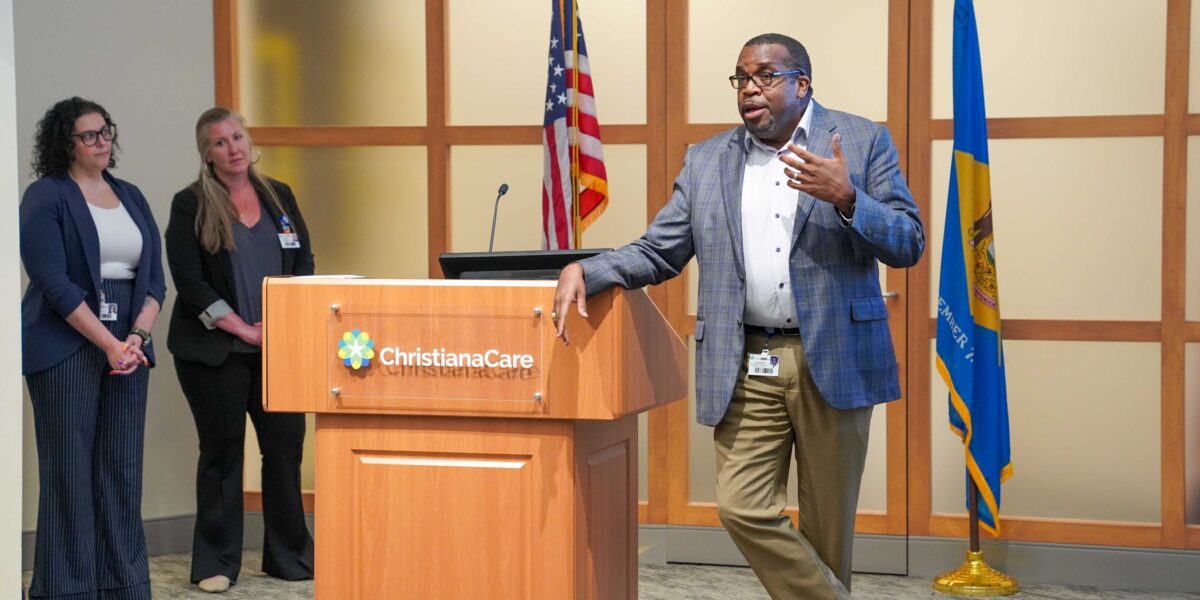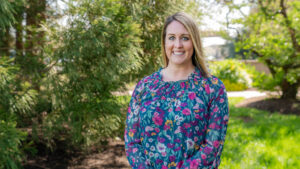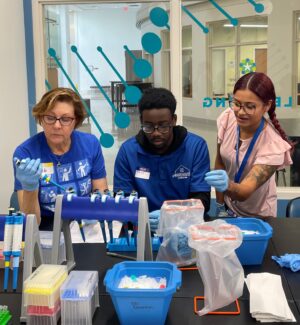Residents in some parts of Wilmington live 16 years less than their counterparts just a couple miles away in more affluent Greenville. African American babies born in Delaware are nearly three times more likely to die in the first year of life than a white baby born in the state.
These statistics reflect a distressing reality — where a person lives, works and learns has more of an impact on their health than the time they spend with a health care provider. For that reason, leaders from ChristianaCare met with elected officials from the city of Wilmington and state government on April 18 to discuss ongoing efforts and partnerships aimed at reducing health disparities and improving outcomes through equitable opportunities for care.
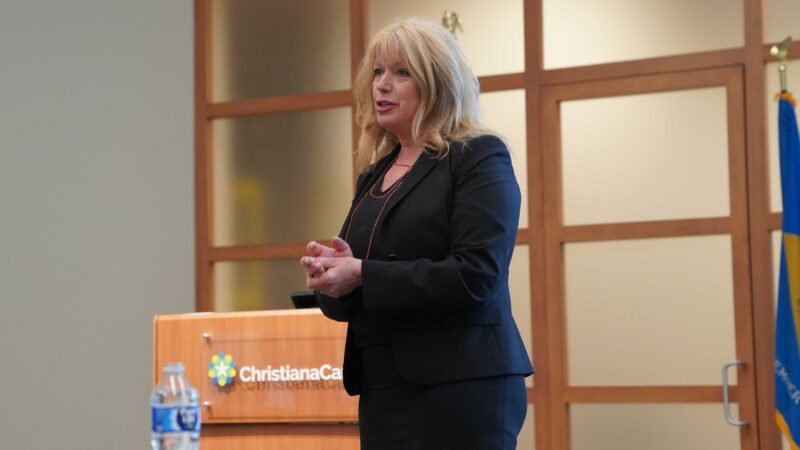
Speaking to the group assembled at Gateway Conference Center in Wilmington Hospital, Bettina Tweardy Riveros, J.D., chief public affairs officer and chief health equity officer for ChristianaCare, said housing, education and workforce development aren’t often thought of as health-related issues, but they must be addressed for a community to truly be able to thrive.
“People can’t even think about their health if they don’t have a job, if they don’t have a place to live, if they need food to eat. So that work is critically important,” Riveros said
Other event attendees included Wilmington Mayor Mike Purzycki and Wilmington Chief of Police Wilfredo Campos, along with members of the Wilmington City Council and the Delaware General Assembly.
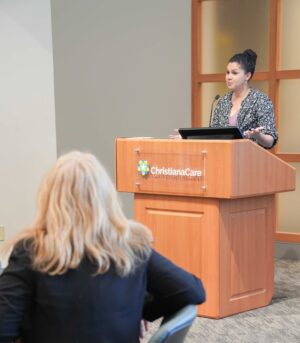
State Sen. Elizabeth “Tizzy” Lockman, who helped coordinate the meeting, said local leaders and community partners must come together and talk to share ideas, innovate and better understand how best to serve all Delawareans, particularly those living in Wilmington.
“It’s really important for us to share our perspectives from time to time and make sure that we’re doing everything we can to see the work that we’re all doing and to be supportive,” she said.
Increasing access to care
Wilmington, Delaware’s largest city, is recognized as a hub for financial and technology services in the region. Despite the presence of credit card companies and other high-powered businesses:
- Nearly one-quarter of Wilmington’s residents are estimated to live in poverty, according to statistic from the U.S. Census Bureau.
- Black and Hispanic students continue to score below their white peers on state standardized tests, a disparity that has been exacerbated by the pandemic.
- Nearly 18% of Wilmington residents live with a disability, according to city health statistics.
- Homeownership rates in Wilmington are below average for all races, and the cost of renting is quickly outpacing many family incomes.
LeRoi Hicks, M.D., MPH, FACP, chief medical officer at Wilmington Hospital, said many residents in the city lack access to transportation, which increases their social vulnerability and impedes their access to medical care and preventive steps like finding healthier food options. Bringing more chronic disease management to Wilmington is a priority for ChristianaCare, which is working to create space for advanced heart failure services on the Wilmington campus.
Hicks said heart failure is statistically more likely to occur in communities that are traditionally medically underserved. He also noted that Delaware has one of the highest mortality rates in the nation for Black women diagnosed with triple negative breast cancer and higher rates of death from lung cancer for Black men in the state compared to white residents.
In Wilmington, heart disease is the leading cause of death, followed by closely by cancer, based on statistics for the years 2016 to 2020.
“If we can improve care here in the city, it substantially moves the needle in terms of cancer outcomes,” Hicks said.
New ways to access health services
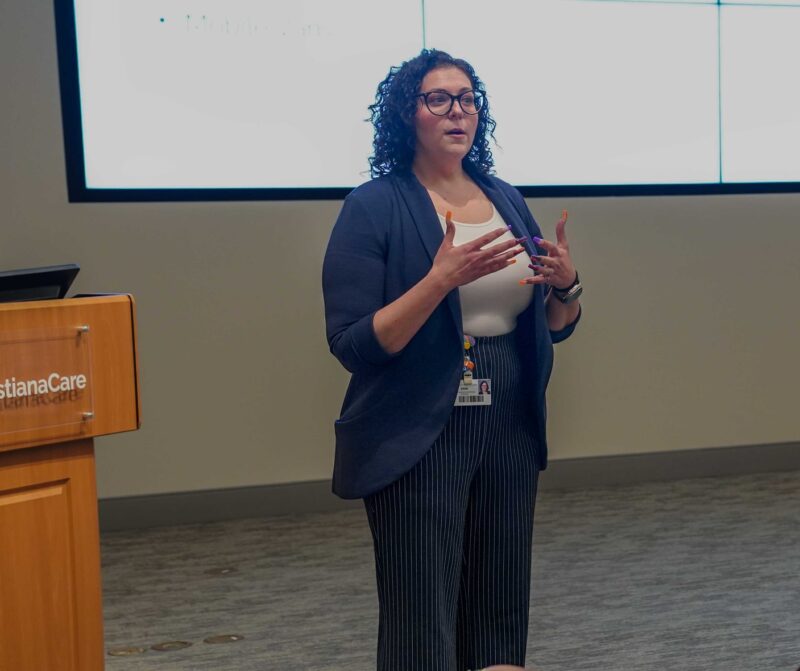
Erin Booker, LPC, chief biopsychosocial officer for ChristianaCare, also discussed other ways ChristianaCare is improving access to care and other resources for people living in Wilmington.
EVOLVE – Empowering Victims of Lived Violence (EVOLVE) is a program that works with individuals who have been injured as a result of gunshot wounds, stabbing or other types of violent attacks. Patients connect with an interdisciplinary team that works to ensure their ongoing medical and social services needs continue to be met after their hospitalization. The program relies on the Unite Delaware platform for social care referrals.
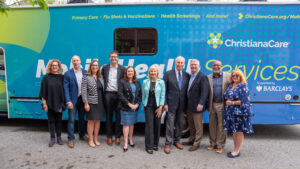
Mobile health vans —Supported through a $1 million donation from Barclays, mobile health vans provide primary care services for people who might not otherwise be able to access care. In addition to having a provider on a van, there also are training opportunities for residents to help them expand their idea of what it means to provide community care. Booker shared the story of a 50-year-old man who hadn’t seen a doctor in more than 15 years. Thanks to one of the vans, he was able to get assistance with mental health needs and also diagnose a hernia. He underwent surgery and is now back in the community in a safe supportive housing environment, Booker said. 
Behavioral Health Unit — Developed in partnership with the New Castle County Police Department, the Behavioral Health Unit assists officers with cases related to mental health crises, substance use disorder and drug diversion. Licensed clinicians act as co-responders, Booker said. They help with cases like that of an individual who had previously called 911 more than 30 times in a month with mental health concerns. The team made a proactive outreach to the individual and connected her with needed resources. As a result, the individual called 911 just twice in the past two months.
Substance Overdose Support (SOS) — This team focuses on patients who come into the emergency department because of an overdose but have declined care for substance use disorder. Using a peer support model, a team goes into the community and connects with these individuals to help encourage them to seek out care for substance use disorder. In one recent case, Booker said, Wilmington police officers found someone unconscious behind the wheel of a crashed motor vehicle. The SOS team connected the person to the Hero Health program, which is the drug diversion program also coordinated through the Behavioral Health Unit. Rather than facing criminal charges, the individual was given assistance to a long-term treatment facility.
“That’s huge. Because before what would happen is they would have been taken in for processing and then released and we would have lost our opportunity to intervene,” Booker said. “If we miss that opportunity, we don’t know if it’s coming back again. That unit is something that we’re really proud of.”
A need for collaboration
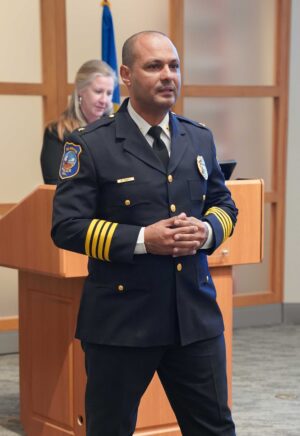
Campos, a 26-year veteran of the Wilmington Police Department, took over as chief earlier this year. He said the past three years have seen an increase in the number of city residents with mental health and substance abuse issues.
“We continue to see the same homes and answer those same calls for service. If we can reduce that, that’s why I’m here to partner with you guys to move that forward,” he said.
Riveros said ChristianaCare continues to evolve to better meet the needs of the community. In 2016 when she joined ChristianaCare, there was no Office of Health Equity or Community Health team. The work on reducing disparities was underway but the approach needed more input from the community.
In the last four years, the Community Health staff has jumped from about 16 caregivers to more than 100, Booker said. Many are Community Health workers who live and work in Wilmington on specific health initiatives.
To continue this string of success, public and private entities, businesses and government and nonprofit organizations must continue to collaborate and share best practice strategies, Riveros said.
“The more that we can work together to align that work, whether it’s around help to keep you from being displaced from your homes or behavioral health support for the police or domestic violence initiatives, the more impact we will have,” she said.
“We’re all in this together. We are all working on the same goals. We want this community to be healthy and vital and safe and thriving.”
